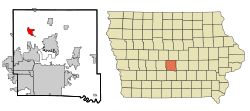Polk City, Iowa facts for kids
Quick facts for kids
Polk City, Iowa
|
|
|---|---|
| Motto(s):
A City For All Seasons
|
|

Location of Polk City, Iowa
|
|
| Country | |
| State | |
| County | Polk |
| Area | |
| • Total | 5.42 sq mi (14.03 km2) |
| • Land | 5.27 sq mi (13.65 km2) |
| • Water | 0.15 sq mi (0.38 km2) |
| Elevation | 843 ft (257 m) |
| Population
(2020)
|
|
| • Total | 5,543 |
| • Density | 1,051.40/sq mi (405.94/km2) |
| Time zone | UTC-6 (Central (CST)) |
| • Summer (DST) | UTC-5 (CDT) |
| ZIP code |
50226
|
| Area code(s) | 515 |
| FIPS code | 19-64020 |
| GNIS feature ID | 2396245 |
Polk City is a city located in Polk County, Iowa, in the United States. It is part of the larger Des Moines metropolitan area. In the 2020 census, the city had a population of 5,543 people. This was a big jump from its population of 2,344 in the 2000 census.
Polk City is known for its beautiful natural surroundings. It is located right along Saylorville Lake and is very close to Big Creek State Park.
Contents
History of Polk City
Polk City was first settled in 1846. It officially became a city on March 13, 1875. In its early days, Polk City was considered to be the main city for Polk County. However, Des Moines was eventually chosen as the county seat instead.
The city got its name from being located in Polk County. Polk City is also special because it has the only "town square" in all of Polk County.
Geography and Location
Polk City covers a total area of about 4.47 square miles (11.58 square kilometers). Most of this area, about 4.32 square miles (11.19 square kilometers), is land. The remaining 0.15 square miles (0.39 square kilometers) is water. This water area includes parts of Saylorville Lake and Big Creek.
Population Changes in Polk City
The population of Polk City has changed a lot over the years. Here's a look at how many people have lived in the city during different census years:
| Historical population | |||
|---|---|---|---|
| Census | Pop. | %± | |
| 1880 | 443 | — | |
| 1890 | 446 | 0.7% | |
| 1900 | 438 | −1.8% | |
| 1910 | 310 | −29.2% | |
| 1920 | 277 | −10.6% | |
| 1930 | 295 | 6.5% | |
| 1940 | 343 | 16.3% | |
| 1950 | 336 | −2.0% | |
| 1960 | 567 | 68.8% | |
| 1970 | 715 | 26.1% | |
| 1980 | 1,658 | 131.9% | |
| 1990 | 1,908 | 15.1% | |
| 2000 | 2,344 | 22.9% | |
| 2010 | 3,418 | 45.8% | |
| 2020 | 5,543 | 62.2% | |
| U.S. Decennial Census | |||
Polk City Population in 2020
According to the census from 2020, there were 5,543 people living in Polk City. There were 1,917 households, which are groups of people living together. The city had about 1,051 people per square mile.
Most of the people in Polk City were White (94.0%). A smaller number were Black or African American (0.6%), Native American (0.1%), Asian (0.7%), or Pacific Islander (0.1%). About 4.1% of residents were from two or more races. Around 2.0% of the population identified as Hispanic or Latino.
The average age of people in Polk City was 35.5 years old. About 34.2% of the residents were under 20 years old. The population was split almost evenly between males (50.0%) and females (50.0%).
Famous People from Polk City
- Derald Langham (1913–1991), a scientist who studied how plants inherit traits, known as an agricultural geneticist.
Education in Polk City
Most of Polk City is served by the North Polk Community School District. Young students in Polk City attend North Polk West Elementary for ages 3 through third grade. Students in fourth and fifth grade go to Big Creek Elementary, which is also in northeast Polk City.
Older students attend schools located a bit further away in Alleman. Students in grades 6-8 go to North Polk Middle School. High school students in grades 9-12 attend North Polk High School. Alleman is about 8.5 miles from Polk City. A very small part of Polk City is also served by the Ankeny Community School District.
See also
 In Spanish: Polk City (Iowa) para niños
In Spanish: Polk City (Iowa) para niños
 | William M. Jackson |
 | Juan E. Gilbert |
 | Neil deGrasse Tyson |

